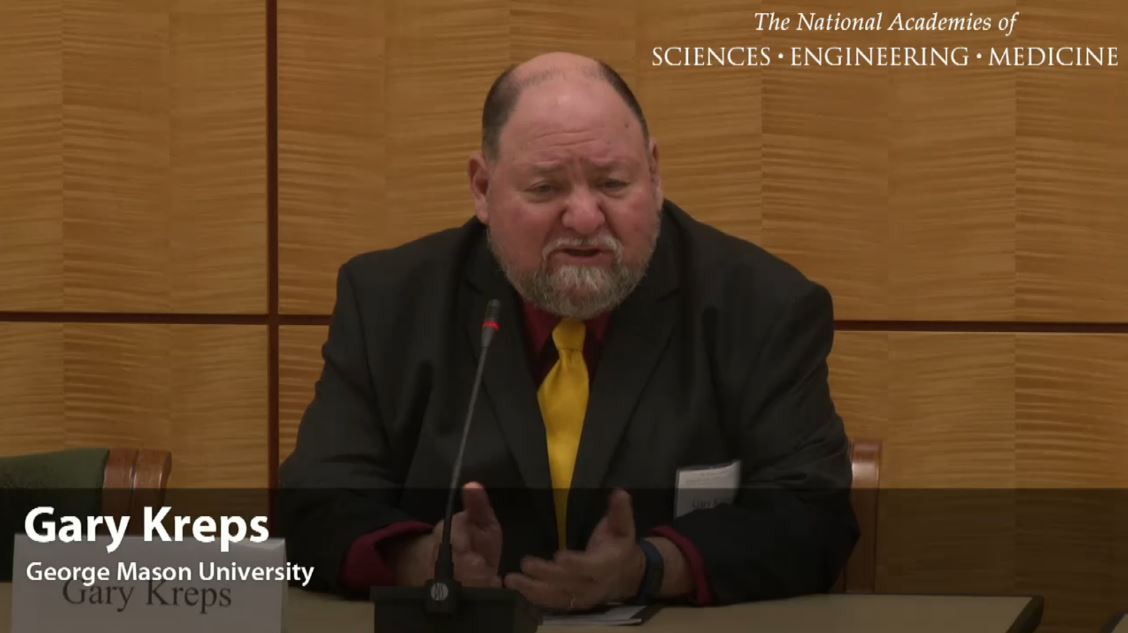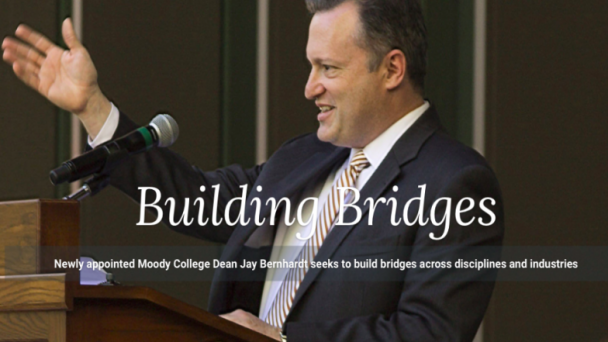Summary
University Distinguished Professor, Department of Communication, George Mason University
Director, Center for Health and Risk Communication
Gary Kreps’ areas of expertise include health communication and promotion, information dissemination, organizational communication, information technology, multicultural relations, risk/crisis management, health informatics, and applied research methods.
Dr. Kreps is an advisor to numerous health communications-related organizations including the Open Network Alliance onHealth Hubs.
OnAir Post: Gary Kreps
Information
GMU website CHRC website
Latest April 2016 CV
Wikipedia page LinkedIn page
Email: gkreps@gmu.edu
Phone: 703.993.1094
Office Hours:
Address: Robinson Hall A 339AB
Fairfax, Va. 22030
Biosketch
Gary L. Kreps is a University Distinguished Professor of the Department of Communication at George Mason University. He teaches undergraduate and graduate courses in Communication Research, Health Communication, Organizational Communication, Consumer-Provider Health Communication, Health Communication Campaigns, and E-Health Communication.
Education
Dr. Kreps received his BA and his MA in Communication from the University of Colorado, Boulder and his PhD from the University of Southern California.
Areas of expertise
Dr. Kreps’ areas of expertise include health communication and promotion, information dissemination, organizational communication, information technology, multicultural relations, risk/crisis management, health informatics, and applied research methods.
Positions
He is the Director of the Center for Health and Risk Communication, serves on the Governing Board of the Center for Social Science Research, and is a faculty affiliate of the National Center for Biodefense and Infectious Diseases, the Center for Health Policy Research and Ethics, the Center for the Study of International Medical Policies and Practices, Center for Climate Change Communication, the Center for Consciouness and Transformation, and the Center for Health Information Technology, at George Mason.
Prior to his appointment at Mason, he served for five years as the founding Chief of the Health Communication and Informatics Research Branch at the National Cancer Institute (NIH), where he planned, developed, and coordinated major new national research and outreach initiatives concerning risk communication, health promotion, behavior change, technology development, and information dissemination to promote effective cancer prevention, screening, control, care, and survivorship. He also served as the Founding Dean of the School of Communication at Hofstra University in New York, Executive Director of the Greenspun School of Communication at UNLV, and in faculty and administrative roles at Northern Illinois, Rutgers, Indiana, and Purdue Universities.
His published work includes more than 350 books, articles, and monographs concerning the applications of communication knowledge in society.
For detailed information about Dr. Kreps’s career, research interests, and accomplishments, view his Curriculum Vitae.
Current Research
Working with:
National Minority AIDS Council to increase minority support for HIV vaccine research
Merck Pharmaceutical Inc to study ways to encourage patients with chronic deiseases to adhere to prescription medication instructions
Entertainment Industries Council to promote effective coverage of mental health issues in the media
National Recreation and Parks Association to evaluate the influences of revitalizing an inner-city DC park on minority youth physical activity and community public health policies
Fairfax County Health Literacy Initiative to enhance health information dissemination and support for vulnerable and at-risk populations in Northern Virginia.
Selected Publications
Kreps, G.L., Villagran, M.M., Zhao, X., McHorney, C., Ledford, C., Weathers, M., & Keefe, B. (2011). Developing and validating motivational message interventions for improving prescription drug adherence with consumers confronting chronic diseases. In R. Batra, P. Anand Kellar, & V.J. Strecher. (Eds.). Leveraging consumer psychology for effective health communications: The obesity challenge (pp. 233-250). Armonk, NY: M.E. Sharpe.
Kreps, G.L., & Finney Rutten, L. (2011). Building the evidence base in cancer communication: Next steps. In L. Finney Rutten, B. Hesse, R. Moser, & G.L. Kreps, (Eds.), Building the evidence base in cancer communication (pp. 315-322). Cresskill, NJ: Hampton Press.
Kreps, G.L., & Neuhauser, L. (2010). New directions in ehealth communication: Opportunities and challenges. Patient Education and Counseling, 78, 329-336.
Kreps, G.L., & Maibach, E.W. (2008). Transdisciplinary science: The nexus between communication and public health. Journal of Communication, 58(4), 732-748.
Kreps, G.L., & Sivaram, R. (2008). The central role of strategic health communication in enhancing breast cancer outcomes across the continuum of care in limited-resource countries. Cancer, 113(S8), 2331-2337.
Kreps, G.L. (2008). Strategic use of communication to market cancer prevention and control to vulnerable populations. Health Marketing Quarterly, 25(1/2), 204-216.
Kreps, G.L., Gustafson, D., Salovey, P., Perocchia, R.S., Wilbright, W., Bright, M.A., & Muha, C. (2007). The NCI Digital Divide Pilot Projects: Implications for cancer education. Journal of Cancer Education, 22 (Supplement 1), S56-S60.
Kreps, G.L. (2006). Communication and racial inequities in health care. American Behavioral Scientist, 49(6), 760-774.
Courses
Fall 2016
COMM 620-001:
Health Communication
07:20 PM to 10:00 PM M
COMM 600-001:
Intro to Graduate Studies
04:30 PM to 07:10 PM M
Previous Courses Taught
399- Health Communication
400- Research Methods in Communication
600- Introduction to Graduate Studies
620- Health Communication
635- Organizational Communication
720- Consumer-Provided Health Communication
721- E-Health Communication
798- Communication Research Projects
820- Health Communication Campaigns
Center for Health and Risk Communication
About
Health and risk communication are areas of great interest and expertise within the Department of Communication and there are growing research and education programs at Mason in this area. Health and risk communication are important interrelated areas of study and application. Health communication examines the communication processes central to the delivery of health care and promotion of health, including health care provider consumer interactions, informed health care decision making, the provision of social support, the development and implementation of health promotion campaigns, and the uses of media and information technologies within the health care system. Risk communication examines strategic communication of serious health and safety risks to relevant publics, government officials, and first-responders, including media management, risk prevention, preparation, and response to health and crisis situations.
The Center for Health and Risk Communication (CHRC) provides an important organizational framework for stimulating innovative health and risk communication research collaborations, health promotion intervention projects, and community interventions. The establishment of the CHRC parallels the development of innovative new health and risk communication graduate programs at both the Masters and Doctoral levels within the Department of Communication, as well as the development of a strong cadre of distinguished faculty scholars with expertise in health and risk communication. Department faculty have received increased national and international recognition for their scholarship and growing external support for health and risk communication research educational activities from a variety of federal agencies and private foundations.
Active research collaborations have been established with leading health and safety scholars across George Mason University and many other national and international research centers. The Department has served as host for several distinguished international health and risk communication scholars who have engaged in collaborative research while at Mason.
The CHRC helps to connect the Department of Communication with a number of relevant external constituencies outside the university, such as the National Cancer Institute (NCI’s) Health Communication and Informatics Research Branch, the NCI Cancer Information Service, the CDC’s National Center for Health Marketing, the AHRQ’s John M. Eisenberg Clinical Decisions and Communications Science Center, the Robert Wood Johnson Foundation’s Health e-Technologies Program, the Coalition for Health Communication, and a number of other important federal agencies and private foundations). There CHRC will be a focal point for plans to establish an innovative new DC-area Research Consortium of Health Communication Programs with collaborations between GMU, Johns Hopkins University, the University of Maryland, Georgetown University, George Washington University, and Howard University.
Information
Dept. webpages: communication.gmu.edu/research-and-centers/center-for-health-and-risk-communication
Email: hlthcomm@gmu.edu
Phone numbers: Communication Office: 703-993-1090; Gary Kreps, PhD: 703-993-1094
Address: Center for Health & Risk Communication
George Mason University
4400 University Drive, MS 3D6
Fairfax, VA 22030
D.C. Health Communication Conference (DCHC)
The 3rd Biennial D.C. Health Communication Conference (DCHC)
“Communication Competence and Health Promotion”
April 16-18, 2015, Hyatt at Fair Lakes Hotel & Conference Center, Fairfax, Virginia
The Center for Health & Risk Communication at George Mason University announces the innovative 2015 D.C. Health Communication Conference, “Communication Competence and Health Promotion,” April 16–18, 2015 at the Hyatt Fairfax at Fair Lakes. The DCHC conference will examine how health communication research, education, technologies, and policies can promote health and well-being. We will feature competitive papers, posters, and panels focusing on cutting edge health communication research and applications. Topics will examine sensitive communication in the delivery of care, strategic communication campaigns, evolving health information technologies, interactive health interventions, powerful media representations of health issues, and relevant new health communication programs, policies, and practices.
Advisory Boards
Center for Technology and Behavioral Health
CTBH brings together a diverse interdisciplinary team with expertise in behavioral health science, treatment, technology, health economics, ethics, regulation, and public policy.
The CTBH team shares a common goal of seeking to harness existing and emerging technologies to effectively develop and deliver evidence-based interventions for substance use and co-occurring disorders. CTBH faculty is organized into two primary cores: Scientific Core and Dissemination & Implementation Core. Core activities focus on identifying and studying state-of-the-art issues related to each of these core topics as they relate to technology-delivered therapeutic tools targeting behavioral health.
The Society for Health Communication
The Society for Health Communication brings together health communication professionals, students, and scholars to create meaningful connections across disciplines and advance the science of health communication. The Society is a member-driven organization that relies heavily on digital media to connect individuals from the diverse areas of teaching, research, and practice. If you share our interests in networking, best practices, advocacy, and training, we hope you’ll become a member today. We’re changing the way health communication professionals collaborate, and we want you to be part of that movement.
U-MD Center for Health and Risk Communication
We are an academic research unit of the University of Maryland committed to advancing interdisciplinary research and theory in health and risk communication; providing communication-based education and training related to health promotion, risk reduction, and resilience; promoting collaboration and dialogue among government, academia, and industry; and improving health and risk communication to inform and empower communities and individuals.
Videos
Workshop on Building Communication Capacity to Counter Infectious Disease Threats
Health Communication post on Workshop organized by Forum on Global Health – Health and Medicine Division of the National Academies of Science, Engineering and Medicine
Session I: Laying the Foundation for Effective Communication 9:10 am PART A – An overview of successful communication capacity – Learning from the social/behavioral/decision science field(s) – Evidence-based methods and evaluation of strategies
Moderated by: Doug Storey
Speakers: Baruch Fischhoff, Carnegie Mellon University Angie Fagerlin, University of Utah Gary Kreps, George Mason University

Gary Kreps speaking at a workshop organized by the Forum on Global Health – Health and Medicine Division of the National Academies of Science, Engineering and Medicine on December 13, 2016.

Gary Kreps responding to question from moderator, Doug Storey
How can we chart the future for digital health information systems?
Published on Dec 1, 2016 | FutureofHealthTech
Gary Kreps at 20th Future of Health Technology Summit at MIT
Are Chemicals killing us?
Published May 21, 2009 | STATSatGMU
Gary Kreps, Ph.D, Director of the Center for Health and Risk Communication at George Mason talks about the challenges facing journalism in translating scientific research for the public, National Press Club, May 21, 2009
Communications Week
April 12, 2014 | LiberalArtsIUPUI
Annenberg Research Seminar
Published Jan. 25, 2012 | USCAnnenberg
Please join students and faculty for a presentation by Gary Kreps (Ph.D. Communication ’79), University Distinguished Professor, chair of the Department of Communication and director of the Center for Health and Risk Communication at George Mason University. His topic: “Examining the Health Information Seeking Behaviors of Korean American Immigrants: Implications for Communication Interventions and Cancer Control.”
From Dr. Kreps: “Korean American immigrants suffer from serious cancer-related health disparities, resulting in significantly higher mortality rates than for members of the general population. This multi-methodological research program examines the communication issues that contribute to these health disparities. Data gathered are being used to design evidence-based, culturally sensitive, and community-based communication interventions to improve health outcomes. Implications will be drawn for development of a communication intervention model for reducing health disparities.”





